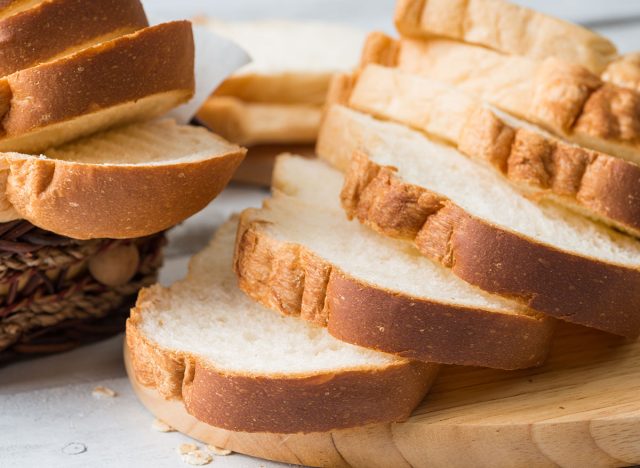The Worst Eating Habits for Memory Loss, Say Dietitians

Your brain health is highly influenced by your lifestyle, and even the foods you eat can help, or harm, your brain, and memory. While there are many foods known to prevent memory loss, there are other foods that have been associated with increased risk for impaired memory and Alzheimer's disease.
Luckily, you can modify your risk for memory loss by avoiding these foods and practicing healthy eating habits.
Read on for the four worst eating habits for memory loss, and for more on how to eat healthy, don't miss The #1 Best Juice to Drink Every Day, Says Science.
Eating too many refined carbohydrates

This is a broad category that includes processed grains that have been stripped of their bran, and in turn, much of their fiber and nutrient content. Examples of refined carbs include white flour and sugar, and common foods made with these ingredients, like white bread, cereal, and pasta.
A 2015 review indicates that a higher intake of simple sugar, like the sugar found in soda and candy, has been associated with lower cognitive function. And, when looking at an elderly population, the risk of mild cognitive impairment or dementia was increased in those who consumed a high amount of their calories from carbohydrates.
These types of carbohydrates are also known to have a high glycemic index, which is a number assigned to food based on how quickly and dramatically it raises blood sugar. The more dramatic the rise in blood sugar, the higher the glycemic load. Studies have found even just one meal containing a high glycemic load can impair memory performance in children and young healthy adults.
While it is possible to enjoy refined carbohydrates as part of a well-rounded, healthy diet, it is best to consume complex "healthy" carbs, like whole grains, fruits, vegetables, and legumes that have a lower glycemic load.
Consuming too much fish high in mercury

You may have heard recommendations to avoid mercury in fish specific to pregnant women, but research indicates it is best for everyone to be mindful of the amount of mercury they consume. This heavy metal is considered to be a neurotoxin and may disrupt the nervous system and brain development, and research indicates mercury poisoning may lead to cerebral palsy and developmental delays.
Mercury can accumulate in bodies of water, and the fish that inhabit these waters. Larger fish with longer life spans, like tuna, swordfish, and king mackerel, are more prone to mercury contamination and should be limited amongst young children and pregnant women as they are more susceptible to the toxic effects of mercury.
While certain populations are more at risk for serious complications, adults can safely consume two to three servings of fish per week as part of a healthy diet. In fact, some varieties of fish, like tuna and salmon, contain essential omega-3 fats, and all varieties of fish are protein-dense and contain many important vitamins and minerals.
Using artificial sweeteners

While sugar-substitutes, like aspartame, have the benefit of providing sweetness without any calories, these sugar alternatives are controversial when it comes to health metrics, including brain health.
One study looked at cognition, mood, and depression characteristics in individuals following a high aspartame diet, and found these individuals to be more irritable, exhibit more depression, and score lower on one cognitive test than when following a low aspartame diet. While this specific study did not observe an influence on working memory, another study conducted in mice observed impaired memory performance in mice who were administered aspartame.
Researchers suggest the negative memory outcomes were likely due to increased oxidative stress and decreased glucose availability to the brain following repeated administration of aspartame.
You may associate artificial sweeteners with diet beverages, and that is one dietary source of these sugar substitutes; however, you will also find aspartame and other sugar alternatives in flavored yogurts, sugar-free candy, and other sweets, protein bars, and gum.
Consuming low-quality fats

Unsaturated fats are typically thought of as being the best source of dietary fat because of the health benefits they provide. While this is true for plant-based unsaturated fats found in foods like avocado, nuts, seeds, and olive oil, manufactured fats are a different story. Trans fat is a form of manufactured unsaturated fat that is thought to have negative effects on the body and brain.
Additionally, saturated fat, which is mostly found in animal-based products, may also have a worrisome impact on the brain. One study notes that greater consumption of saturated and trans fats is associated with poor recall and recognition on a cognitive performance test. Another study found similar outcomes noting a relationship between saturated and trans fat intake and risk of cognitive disorders.
While saturated fats can be naturally found in animal products, like beef, eggs, and cheese, trans fats are more commonly found in processed foods, like margarine and shortening, and the foods made with such ingredients, like baked goods.
Takeaway

While the impact of food on brain health and memory is still being researched, current data provide enough information to warrant caution when consuming the above foods.
Genetics and other factors likely play a role in memory as well, but food choices are one actionable steps you can manage in efforts to maximize your brain health and memory.
And for more, check out The Best Supplements For Memory Loss, Say Dietitians.









